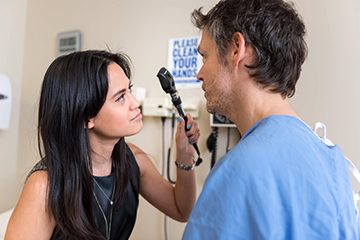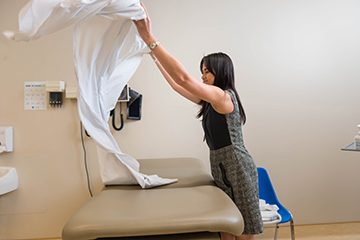
Deirdré Fang trains healthy people to play the role of patients with medical conditions as part of UBC’s Standardized Patient program
When you visit a doctor, you might not expect to be the first patient they’ve ever treated.
Yet a scenario like this is no cause for alarm for UBC’s Deirdré Fang, or the over 500 patient actors she coordinates for the Faculty of Medicine’s Standardized Patient program. In fact, it’s all part of the job.
“We train healthy people, usually professional actors, to play the role of patients with medical conditions,” explains Deirdré, who has been a trainer and project manager with the program since 2011. The goal is to simulate a medical examination as realistically as possible to help teach and assess medical students.
Often, it’s the first time these future doctors will have met with a live patient.
“The medical students love interacting with standardized patients because it’s such a great learning tool,” says Deirdré. “Sometimes the students don’t even know the standardized patients are acting, because they play the role so well.”

Computers or medical mannequins can be used to simulate patients, but there is a lot of value in practicing clinical skills on a real human being, says Deirdré.
Seeing the standardized patients succeed as performers is a source of pride for Deirdré, whose background is in theatre. After graduating from the American Musical and Dramatic Academy in New York, she returned to Vancouver to be close to her family and joined UBC soon afterward.
“My theatre background really helps me in this work,” explains Deirdré. “I really enjoy getting to use it for something that I feel is so worthwhile.”
Indeed, the program is an important part of student learning. While computers or medical mannequins can be used to simulate patients, there is a lot of value in practicing clinical skills on a real human being.
“A mannequin can’t really react if a medical student is presenting poor communication skills, but a person can respond like a real patient would,” Deirdré notes.
Faculty and students agree, telling Deirdré that interacting with people is something that a textbook, computer, or mannequin simply can’t replicate. For Deirdré, knowing that she’s helping students learn is part of why she enjoys her work so much. “It’s also just a lot of fun,” she adds.
However, the role does not come without challenges. “If you have a theatre background, this type of work isn’t likely something you ever thought you’d be doing,” Deirdré acknowledges, noting the learning curve for new trainers who must quickly learn unfamiliar medical terminology and cases. Consistency is also critical, and it’s Deirdré’s job to ensure that all standardized patients perform their role accurately.
“But our team is really well supported by physicians in the Faculty who train us,” Deirdré goes on to say. “They help show us the ropes.”

Knowing that she’s helping students learn is part of why Deirdré enjoys her work so much.
Along with the rigor and standardization involved, Deirdré sees that the strength of the program also comes from the creative, human side of her work. “I sometimes meet doctors who have graduated from UBC’s medical program out in the real world, and they say that they still remember how much their first interview with a standardized patient impacted them, and that they carried it through their career.”
“That makes me really proud to work here, and I love my job and my team,” Deirdré adds. “The only thing that’s missing is that I don’t get to sing and dance!”